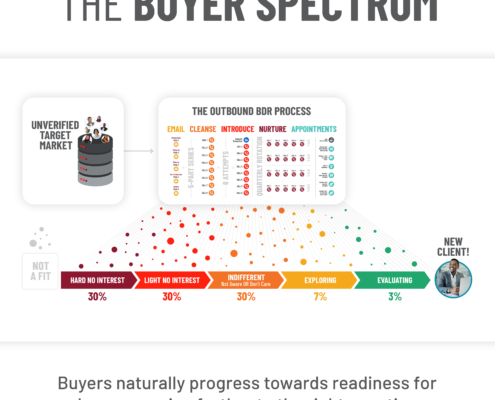

A strong sales development team is key to achieving sustainable growth. However, building and managing an effective team can be a challenge, especially for growing businesses with limited resources. That’s why many companies turn to outsourcing their sales development needs.
In this article, we’ll provide a comprehensive guide to building high-performing outbound and inbound sales development teams. We’ll cover everything from the roles and responsibilities of team members to the key steps involved in creating a successful sales development strategy.
Keep reading to learn more.
What Does a Sales Development Team Do?
A sales development team is responsible for finding and qualifying new sales opportunities. They work closely with sales and account executives to identify target accounts, engage prospects, and set appointments. By doing so, they help account executives spend more time on selling and less on prospecting, qualifying, and nurturing.
The role of a sales development team is to create top-of-funnel opportunities by identifying and engaging with potential customers who have shown interest in a product or service. They use various outreach methods such as cold calling, email campaigns, social media, and webinars to generate leads and schedule appointments.
Once a lead has been identified, the sales development team qualifies it by assessing the prospect’s needs, budget, and decision-making authority. They also provide information about the product or service to help the prospect make an informed decision.
A good sales development team plays a critical role in the sales team’s success. By creating and qualifying leads, they help account executives focus on what they do best: closing deals.
Who Should Be on a Sales Development Team?
Building a successful sales development team requires careful consideration of the individuals involved. A sales development team typically consists of specialized sales professionals who work together to generate new leads, qualify them, and set appointments for account executives.
Here are the key players involved in a sales development team:
- Sales Development Representatives: These individuals are the frontline representatives of the sales development team. Their primary role is to reach out to prospects, qualify them, and set appointments with the account executives. SDRs typically use various outreach methods such as phone, email, social media, and webinars to generate leads and schedule appointments.
- Sales Managers: Sales managers oversee the SDRs and ensure they stay on pace to hit their goals. They provide training and coaching to help sales reps improve their appointment setting skills. Sales managers also set targets and KPIs, monitor performance, and adjust strategies to improve results.
- Sales Data and Operations Analysts: These individuals are responsible for building prospect lists and prioritizing hot leads for sales reps to contact. They also develop and implement data-driven sales strategies by analyzing market trends and customer behavior to identify opportunities for growth.
- Email Marketing Specialists: Email marketing specialists are responsible for crafting sales emails that nurture the relationship with prospects and guide them towards the end of the sales funnel. They work closely with SDRs to develop effective email campaigns that move prospects through the sales pipeline.
A successful sales development team requires a cohesive and collaborative effort among these individuals. By working together, they can create a robust pipeline of qualified leads and give account executives a steady stream of high-quality sales opportunities to work with.
Steps to Building a High-Performing Outbound Sales Development Team
Outbound sales strategies are critical to a successful business. Even with the growing popularity of inbound sales initiatives, outbound programs remain an effective way to drive customer engagement. Outbound operations account for 55% of generated leads, while inbound sits at around 27%. It doesn’t matter how innovative your products and services are or how clever your marketing is—if you aren’t actively pursuing and qualifying leads, you’re missing out on revenue.
When you devote resources to building a sales team and an outbound sales plan, you keep your business on track for expansive growth. However, establishing a refined sales cycle and a world-class group of sales professionals to pursue lead generation isn’t easy. You need sales development representative (SDR) managers who know how to identify potential sales reps and train them to communicate the story of your business to buyers successfully.
Outbound sales strategy is a science. You can’t expect to succeed without the right direction. Building a high-performing outbound sales development team requires careful planning and execution. Here are six steps to help you build a successful SDR team:
Step 1: Determine Your Ideal Sales Roles
Before you build your sales development team, it’s important to determine what you want to achieve and the roles you need to fill to achieve it. Refer back to the previous section to understand the key players involved in a sales development team and the responsibilities of each role. Determine what skills, experience, and characteristics are required for each role to find the right people for your team.
Step 2: Hire Skilled Sales Experts
Hiring the right talent is critical for a successful sales development team. Look for individuals with a strong work ethic, excellent communication and interpersonal skills, and a track record of success in sales. Other important qualities to look for include problem-solving abilities, resilience, and a willingness to learn and adapt.
Not sure what hard and soft skills to look for? Read our blog here to learn what traits high-performing sales reps should have.
Step 3: Develop a Sales Enablement Strategy
Once you’ve assembled your sales development team, it’s important to develop a sales enablement strategy. This includes assigning roles and responsibilities to each team member, developing a process for lead qualification and nurturing, and implementing technology to support your sales efforts. A clear sales enablement strategy ensures that everyone on your team knows their place in the process and can work together more efficiently.
Step 4: Put Your Sales Development Strategy Into Action
With your sales enablement strategy in place, it’s time to put it into action. Identify any gaps in the process early so you can adjust your strategy as needed. Provide training and coaching to help your team members improve their skills and become more effective in their roles.
Step 5: Review and Adjust Strategy as Needed
It’s important to review your sales development strategy routinely to see where prospects aren’t converting into sales opportunities or customers. Having a dedicated sales data and operations analyst is important for this step because it empowers you to analyze data, solicit feedback from your team, and identify areas where improvements can be made. Then, they can just your strategy as needed to keep your team on track and achieve your goals.
Step 6: Repeat Steps 4 and 5
Repeating steps 4 and 5 regularly can help you achieve a more sustainable and predictable sales pipeline. Continually refine your sales development strategy based on feedback and data analysis to stay ahead of the curve and drive better results.
Reasons Companies Outsource Their Sales Development Teams
Your outbound sales pipeline needs to run 24/7/365. Do you have the team, technology, and infrastructure to make it work? Keeping your outbound sales efforts in-house may offer you more control, but outsourcing your SDR team is cheaper and frees your hands (and budget) to address other matters.
Here are some reasons why outsourcing often makes sense for small to medium-sized businesses:
Save Time
Outsourcing SDR teams gives businesses more time to spend on their everyday operations. By leaving the prospecting, qualifying, and nurturing of leads to an outsourced team, businesses can focus on closing deals and building relationships with existing customers.
Save Money
When you hire your own sales reps, you must account for expenses like taxes, workspace, workstations, IT, sick leave, and more. Hiring an outsourced team helps businesses save money because they don’t have to worry about salaries, benefits, or purchasing the tools needed for sales enablement. This can be especially cost-effective for small businesses that don’t have the resources to hire and train their own SDR team.
Rely on an Experienced, High-Performing Sales Development Team
Outsourcing sales development teams means businesses are guaranteed to have experienced, high-performing salespeople reaching out to prospective customers. These individuals have been trained in sales best practices and can effectively engage potential customers.
Gain Access to the Best Sales Resources
Outsourcing an SDR team gives businesses access to costly and complex sales software. This can include lead generation tools, CRM systems, and automation software that streamlines the sales process.
Additionally, outsourced SDR teams often specialize in a particular industry or niche, giving businesses access to sales professionals with deep knowledge and experience in their target market. This can be especially valuable for businesses entering a new market or vertical.
Increase Scalability
Outsourcing sales development teams allows businesses to scale their sales efforts quickly and easily without worrying about hiring and training new in-house staff.
Improve Flexibility
Outsourcing sales development teams give businesses greater flexibility to adjust their sales tactics based on changing market conditions, customer needs, or other factors.
Reduce Risk
Outsourcing mitigates the risks associated with hiring and training new staff, as well as the risk of investing in sales technology and tools that may not deliver the desired ROI.
Key Takeaways
Building a high-performing sales development team takes effort and time, but it’s worth it. Start by understanding your ideal sales roles, hiring skilled experts, and developing and adjusting a sales enablement strategy to create a sustainable sales pipeline.
Outsourcing sales development teams is becoming increasingly popular, as it saves time and money, provides access to experienced salespeople, and generates high-quality leads while creating a sustainable sales pipeline.
At Abstrakt, our outbound lead generation services allow growing businesses to prioritize everyday operations while we focus on filling their pipeline with qualified prospects. Contact us today to learn more about how we can help your business achieve its sales goals.




